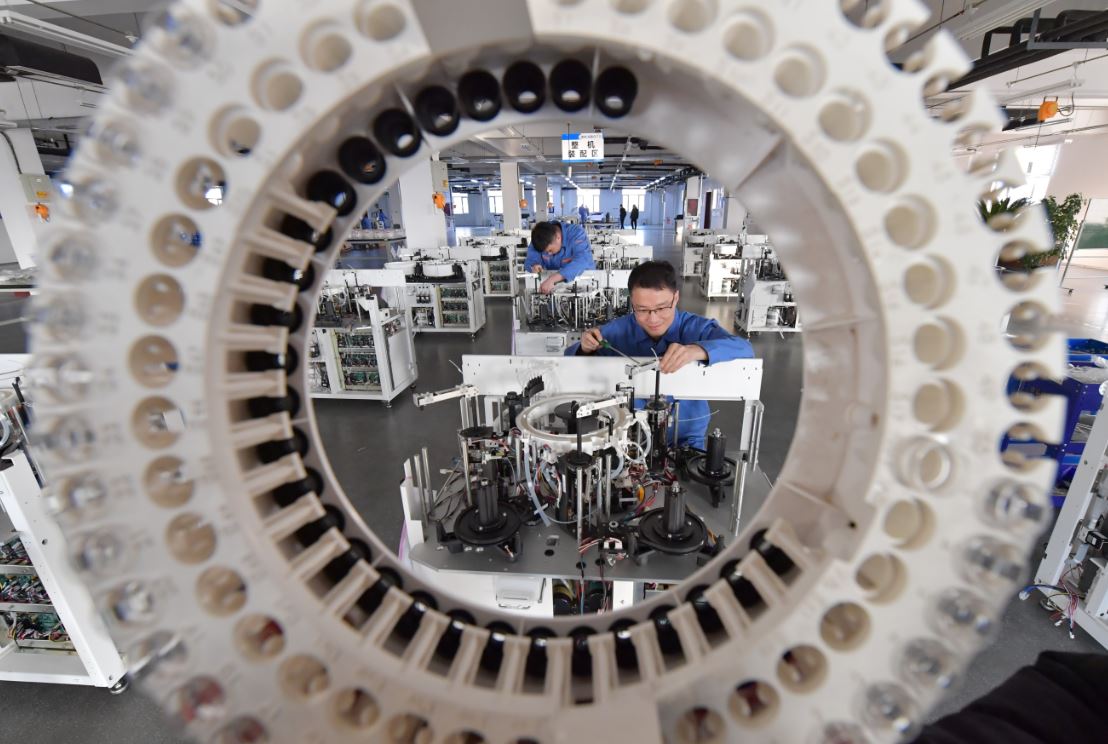Key growth role for new economy
New economy sectors are set to be a strong anchor of China's growth, as the expansion momentum of these sectors dictated by technological advances and changes in lifestyle is unlikely to be impeded by external uncertainties, analysts said on Monday.
New economy sectors are set to be a strong anchor of China's growth, as the expansion momentum of these sectors dictated by technological advances and changes in lifestyle is unlikely to be impeded by external uncertainties, analysts said on Monday.

Technicians assemble products at a medical equipment facility in Qian'an, Hebei province. [Photo/Xinhua]
They commented after the National Bureau of Statistics released figures on Sunday showing that the output of new industries and new forms and models of business grew by 12.2% year-on-year in nominal terms last year, 2.5 percentage points higher than nominal GDP growth.
These new economy sectors fostered by technological applications and advances – such as advanced manufacturing, new energy, internet plus and high-tech services – contributed 16.1% to China's GDP last year, up from 15.8% in 2017, according to the NBS.
The growth momentum of the new growth drivers has extended into this year, despite the overall easing in growth amid prolonged trade tensions.
NBS data showed that the revenue of the high-tech services sector grew by 12.3% in the five months, 2.2 percentage points higher than the whole services sector. Profits of strategic emerging industries in the first half of the year, meanwhile, rose by 2.3% and also outperformed the whole industrial sector's performance.
"Robust expansion of the new economy sectors is indeed a strong anchor for the Chinese economy," said Liu Chunsheng, an associate professor at the Beijing-based Central University of Finance and Economics.
As people's lifestyles are reshaped by new business models and as technological advances deepen, new business models are expected to keep springing up and injecting new growth momentum, despite external uncertainties, according to Liu.
"Players in China's highly competitive internet sector are continuously bringing up new business ideas, while the country has favorable market conditions for testing those ideas," Liu said.
For instance, the development of the sharing economy is dependent on the vast domestic market, strong infrastructure network and high population density in China, Liu said.
To deal with downside pressure, policymakers should also consider offering more support to revitalize traditional industries, especially privately owned manufacturing sectors, as the scale of new economy sectors is still limited at present, Liu added.
In the first six months, the profits of China's major industrial firms declined by 2.4% year-on-year, versus 2.3% in the January-May period, mainly attributable to the shrinking profits of the auto, oil processing and steel industries, the NBS said on Saturday.
Wang Yi, head of China Economics with Credit Suisse, said that the rising prices of raw materials, such as crude oil and iron ore, have pushed up costs, while additional tariffs and uncertainties caused by trade tensions also dampened profit growth.
Looking into the second half, external uncertainties may continue weighing on industrial profits, but the tax and fee cuts starting from April will offset part of the negative effects, Wang said.
Monetary policy may lend further support by cutting the reserve requirement ratio of financial institutions and directing more credit resources into small-and medium-sized enterprises, according to Wang.
Besides facilitating the financing of small businesses, policies to boost infrastructure investment, which will in turn spur demand for industrial products, are also expected to be rolled out, said Zhang Wenhui, a researcher with the Industrial Economy Institute at the China Center for Information Industry Development.
"In addition, more provincial and municipal governments are expected to set out plans to improve industrial profits," Zhang said, citing that local governments had stepped up efforts to improve business environment and clear arrears owed to SMEs in the first half.
As policy support takes effect and eases the burden of costs and expenses faced by industrial firms, growth in industrial production and profit may stabilize in the second half, Zhang said.

